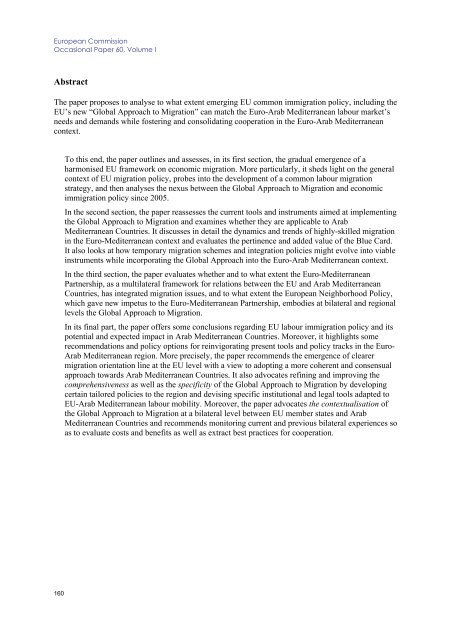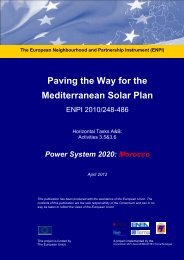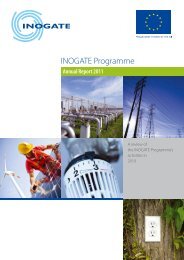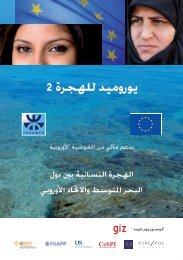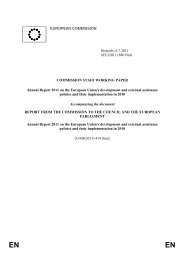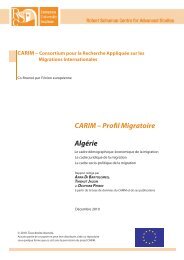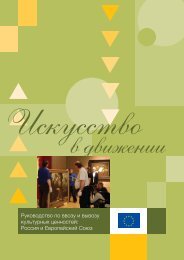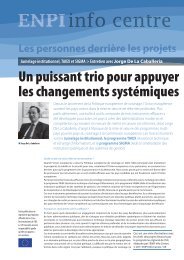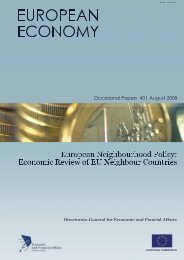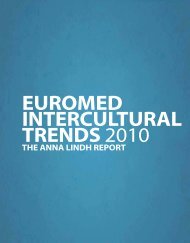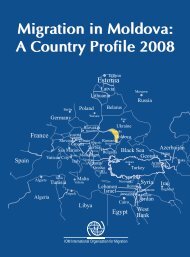Labour market performance and migration flows - European ...
Labour market performance and migration flows - European ...
Labour market performance and migration flows - European ...
You also want an ePaper? Increase the reach of your titles
YUMPU automatically turns print PDFs into web optimized ePapers that Google loves.
<strong>European</strong> CommissionOccasional Paper 60, Volume IAbstractThe paper proposes to analyse to what extent emerging EU common im<strong>migration</strong> policy, including theEU’s new “Global Approach to Migration” can match the Euro-Arab Mediterranean labour <strong>market</strong>’sneeds <strong>and</strong> dem<strong>and</strong>s while fostering <strong>and</strong> consolidating cooperation in the Euro-Arab Mediterraneancontext.To this end, the paper outlines <strong>and</strong> assesses, in its first section, the gradual emergence of aharmonised EU framework on economic <strong>migration</strong>. More particularly, it sheds light on the generalcontext of EU <strong>migration</strong> policy, probes into the development of a common labour <strong>migration</strong>strategy, <strong>and</strong> then analyses the nexus between the Global Approach to Migration <strong>and</strong> economicim<strong>migration</strong> policy since 2005.In the second section, the paper reassesses the current tools <strong>and</strong> instruments aimed at implementingthe Global Approach to Migration <strong>and</strong> examines whether they are applicable to ArabMediterranean Countries. It discusses in detail the dynamics <strong>and</strong> trends of highly-skilled <strong>migration</strong>in the Euro-Mediterranean context <strong>and</strong> evaluates the pertinence <strong>and</strong> added value of the Blue Card.It also looks at how temporary <strong>migration</strong> schemes <strong>and</strong> integration policies might evolve into viableinstruments while incorporating the Global Approach into the Euro-Arab Mediterranean context.In the third section, the paper evaluates whether <strong>and</strong> to what extent the Euro-MediterraneanPartnership, as a multilateral framework for relations between the EU <strong>and</strong> Arab MediterraneanCountries, has integrated <strong>migration</strong> issues, <strong>and</strong> to what extent the <strong>European</strong> Neighborhood Policy,which gave new impetus to the Euro-Mediterranean Partnership, embodies at bilateral <strong>and</strong> regionallevels the Global Approach to Migration.In its final part, the paper offers some conclusions regarding EU labour im<strong>migration</strong> policy <strong>and</strong> itspotential <strong>and</strong> expected impact in Arab Mediterranean Countries. Moreover, it highlights somerecommendations <strong>and</strong> policy options for reinvigorating present tools <strong>and</strong> policy tracks in the Euro-Arab Mediterranean region. More precisely, the paper recommends the emergence of clearer<strong>migration</strong> orientation line at the EU level with a view to adopting a more coherent <strong>and</strong> consensualapproach towards Arab Mediterranean Countries. It also advocates refining <strong>and</strong> improving thecomprehensiveness as well as the specificity of the Global Approach to Migration by developingcertain tailored policies to the region <strong>and</strong> devising specific institutional <strong>and</strong> legal tools adapted toEU-Arab Mediterranean labour mobility. Moreover, the paper advocates the contextualisation ofthe Global Approach to Migration at a bilateral level between EU member states <strong>and</strong> ArabMediterranean Countries <strong>and</strong> recommends monitoring current <strong>and</strong> previous bilateral experiences soas to evaluate costs <strong>and</strong> benefits as well as extract best practices for cooperation.160


